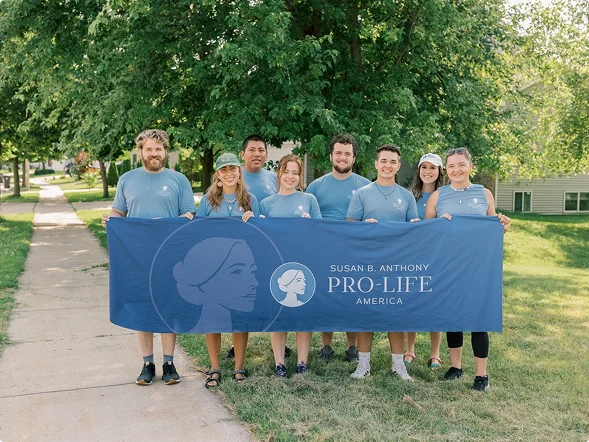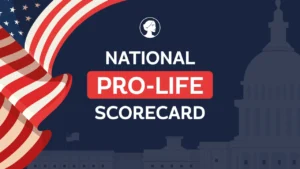The Underpublicized Lawsuits in 5 States with Abortion Amendments

Since the Dobbs decision, five red and purple states have added a pro-abortion amendment to their constitution. During campaigns, abortion activists have branded these ballot measures as health care. They say the amendments safeguard “a decision between a woman and her doctor,” “limit government interference,” and “protect women’s lives.”
New lawsuits from the abortion lobby reveal the amendments were intended to do the opposite of their catchy slogans. Here’s a summary of the litigation in Missouri, Arizona, Montana, Michigan, and Ohio that will undo health protections for women and girls, grow government with taxpayer funding of abortion, and remove doctors from the equation.
Missouri
The day after Amendment 3 narrowly passed with 51% of the vote, Planned Parenthood filed a sweeping lawsuit. The litigation targets far more than the state’s life at conception law, aiming to take down these protections in state statute:
- Requiring abortionists to give informed consent
- Requiring a 72-hour waiting period before a woman has an abortion
- Prohibiting unborn babies from being aborted because of race, sex, or risk for Down Syndrome
- Certain licensing and inspection requirements
- Requiring abortions to have certain hospital admitting privileges
- Requiring abortionists to report data related to abortions to the state
- Prohibiting telemedicine abortions
- Preventing health care professionals other than doctors from performing abortions
- Requiring abortionists to maintain plans and agreements for handling complications from abortions
Though the state has had to concede that the law protecting unborn children before viability is in conflict with the amendment, Attorney General Andrew Bailey is putting up an unprecedented fight to maintain longstanding protections for women and girls. Bailey is fighting for the industry to continue to be regulated and is also taking a stand on discriminatory abortions, saying in court documents:
“[Planned Parenthood] shockingly asserts a constitutional right to abort a child just because the father is black, just because the baby is a girl, or just because the baby is expected to have Down syndrome.”
Though the case will take several months to resolve, Judge Jerri Zhang could issue a ruling any day on whether laws will remain in effect during the process. Planned Parenthood says it can’t resume abortions in Missouri until Zhang decides how the amendment applies to existing regulations protecting women and girls.
Arizona
Following the passage of Prop 139 in November, the ACLU, Planned Parenthood, and the Center for Reproductive Rights sued to remove the state’s 15-week limit on abortion that protects babies at the point science shows they feel pain. The abortion lobby has more in store, saying they plan to target more than 40 laws relating to abortion. Laws similar to the health and safety protections being challenged in Missouri as well as parental consent are expected to be on the chopping block.
“The amendment itself does not sort of wipe the statute books clean, you know. Further action is needed in order to take that additional step to effectuate the amendment’s promise,” ACLU staff attorney Rebecca Chan said.
“The 40-plus laws that are still on the books don’t automatically disappear,” said Chris Love, a senior adviser to Planned Parenthood Advocates of Arizona. “There will need to be legal challenges to most or all of those 40 laws and regulations.”
Montana
Last summer, Montana’s Department of Public Health and Human Services proposed rules to require abortion businesses to adhere to the same standards as surgical centers, implementing a law passed by the Montana Legislature. Requirements would include:
- Having lit exit ways
- Undergoing annual inspections
- Ensuring facility directors are in good standing
- Giving physicians oversight of facilities
- Submitting anesthesia reports
- Having staff trained in resuscitation
Retired board-certified OB-GYN and former abortionist Dr. Kathi Aultman supported the rules:
“No one who cares about patient safety and the provision of quality care should object to these proposed rules. These health and safety regulations do not stop abortions from happening any more than similar regulations stop medical facilities from providing care. Abortion centers should not be exempt from the regulations imposed on similar medical facilities that are designed to protect patients.”
A district court stopped the rules from taking effect in mid-November following the passage of CI-128, essentially saying that applying the same rules already in effect for medical providers to abortion businesses conflicted with the amendment. The case is expected to end up at the state Supreme Court, which sided with the abortion lobby in August to strike down the state’s parental consent law.
Michigan
Michigan became one of the first states to pass an abortion ballot measure in 2022. After voters approved Prop 3, Gov. Gretchen Whitmer and Democrats in the statehouse ended the state’s partial birth abortion ban and a number of health and safety protections for women. However, they lacked votes to completely fulfill the vision of their amendment, so the abortion lobby turned to the courts.
In Northland Family Planning Clinic v. Michigan, pro-abortion advocates at the Center for Reproductive Rights are challenging several Michigan laws that require that women give informed consent, have a 24-hour reflection period, and are seen by a licensed physician prior to obtaining an abortion. In June, the court of claims sided with the abortion industry and halted all three protections. The court’s decision explicitly stated that “Michigan voters dramatically changed the Michigan Constitution by adopting § 28 of Article 1.”
In another lawsuit, Young Women’s Christian Association of Kalamazoo, Michigan v. State of Michigan, the YWCA of Kalamazoo is challenging Michigan laws which protect taxpayers from having to fund elective late-term abortions. The YWCA argues that these laws are now unconstitutional under Prop 3. ACLU of Michigan Deputy Legal Director Bonsitu Kitaba claims that:
“The Michigan Constitution guarantees the fundamental right to reproductive freedom for everyone, but the coverage ban singles out and excludes people who are Medicaid-eligible from this right…this is unacceptable…we will continue to fight to ensure that abortion care is available to all.”
The abortion lobby has also begun laying the groundwork to undo parental rights in Michigan as they have in Montana and other states. Just this past March, the ACLU of Michigan issued a report saying that parental consent laws “harm young people and should be repealed.”
Ohio
Knowing they’d have little success in the Republican majority legislature, Ohio’s abortion lobby turned to the courts soon after Issue 1 passed in November of 2023.
In Preterm-Cleveland v. Ohio, a group of Ohio abortion businesses and a practitioner represented by the ACLU of Ohio and Planned Parenthood have challenged several Ohio laws – laws that ensure reflection periods, informed consent, and in-person consultation with a licensed physician – because they allegedly infringe on the “right to abortion” created by Issue 1. The state argues that the laws in question are essential for informed consent and screening for coercion or abuse. Yet the court ultimately enjoined the laws as hindering the right established by Issue 1, which the judge stated goes further than “restoring Roe.”
In Planned Parenthood Southwest Ohio Region v. Ohio Department of Health, a group of abortion businesses and practitioners are suing to revoke a law that prevents sending dangerous chemical abortion drugs through the mail and which requires that women receive in-person counseling and screening by a licensed physician prior to obtaining the drugs. These laws are essential for screening for ectopic pregnancies or other life-threatening complications. However, pro-abortion advocates argued that Issue 1 invalidates these essential protections for women. The court sided with the abortion advocates and enjoined the laws while the case proceeds. The deciding judge admitted in his opinion that Issue 1 “immediately nullified the status quo,” and that the amendment goes further than Roe.
What’s Next?
What is the next step for the pro-life movement in these states? How can pro-lifers make progress in places where sweeping abortion amendments have passed? Republican attorneys general can and should fight as Andrew Bailey is fighting in Missouri, according to Sue Liebel, director of state affairs for SBA Pro-Life America.
“They should endeavor to keep every protection for women, girls, and babies that they possibly can,” says Liebel.
As for the bigger question of eventually rolling back pro-abortion amendments with amendments that contain abortion limits, Liebel says those efforts will only be successful if coalitions are organized and united, campaigns can raise money, and Republican leaders engage.
“We must have the GOP engaged to win ballot fights. That was the common theme in Florida, Nebraska, and South Dakota where we won this year. Governors, U.S. senators, and members of congress have to lead the charge.”
Want to know more? Read SBA’s analysis of the 2024 ballot measure wins and losses here.
Make your gift to serve women and save babies today.
SBA Pro-Life America's mission is to end abortion by electing national leaders and advocating for laws that save lives, with a special calling to promote pro-life women leaders. Your secure gift today will help to advance a culture of life and protect unborn children and their mothers from abortion.
Donate


















